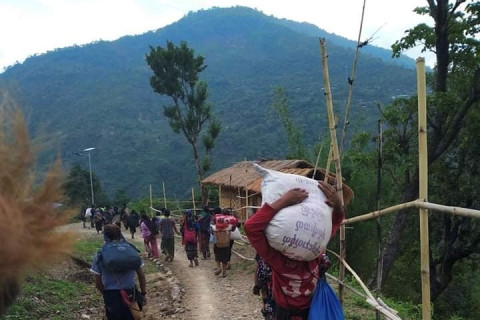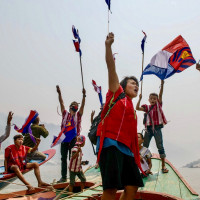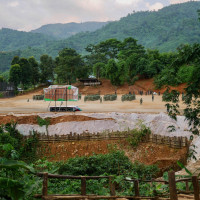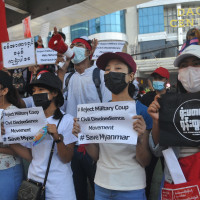Can we avoid more bloodshed? A reflection on the ethnic crisis in Myanmar A Myanmar Commentary by Cheery Zahau
After decades of conflict, it is often said that that political struggle in Myanmar has three groupings: military, pro-democracy and ethnic. But, as Cheery Zahau argues in this commentary, the ethnic nationality cause is frequently marginalised and misunderstood. Paradigm shifts in political behaviour and perspectives are required on all sides if the failures of the past are not to be repeated.

Reuters
As a teenage high-school graduate, I fled to India and joined the democracy movement through a Chin women’s organisation based on the India-Myanmar border. My hunger for knowledge in politics led me into the devotion of my whole youth working on human rights and gender equality for my country and my community – the Chin people. As political change began in 2011, I returned to my land immediately and tried my best to contribute to a federal democratic country and a better society.
Today, we are living under military rule again as a result of the coup d’etat on 1 February. This political turmoil leaves us with more chaos and with more violence by both state and non-state actors. The national armed forces, known as the Tatmadaw, have indicated no political will to end the state of confrontation and crisis. Tatmadaw leaders want power and control, clinging on to their philosophy of the guardianship of the nation. Democracy supporters, known as the Spring Revolution, want the removal of the military from politics and the abolition of the 2008 constitution, which enshrines the Tatmadaw’s role and privilege in politics. As a result, any progress in political reform and national reconciliation during the past few years – even if limited – is reverting back to square-one. The country could be following a course towards destruction.
This presents many dilemmas over political choices for Myanmar’s long-suffering peoples. For the Spring Revolution, it is unacceptable to suggest a dialogue at this moment because supporters want to see the military weakened and removed from political life. Offering peace and dialogue to Tatmadaw leaders at such a time is considered to be submitting to military power. I understand this rationale, as the armed forces have shown no hesitation in using violence to suppress demonstrators and its perceived opponents.
At the same time, the removal of the military from national politics is what we – the ethnic peoples – have been struggling for across the decades, whether through political parties, armed resistance or, more recently, a nationwide peace process. Our situation, however, is often misunderstood, and ethnic politics is often regarded as a secondary issue to the challenges of socio-political transition in the country at large.
The struggle of ethnic nationality movements
This marginalisation of non-Bamar peoples must come to an end. The military is not the only institution that oppresses our existence, political aspirations and economic goals. There are other power-houses in the country that we also have to deal with every day. Four major problem areas stand out.
We do not have economic power. Economic power is mostly vested among the ethnic Bamar elite, a disparity that worsened when the military government transformed the country from a socialist to market economy system during the 1990s. In doing this, the military leaders hand-picked and created a group of business cronies that continue to dominate much of the country’s formal economy today. Sooner or later, this economic inequality must be addressed.
We do not have national institutions that hold up “soft power” like those of majority Bamar citizens who influence everyday aspects of our lives through such soft power tools as religious, media and entertainment organisations. These are powerful tools that can suppress or liberate ideas, behavior and culture, which we become adhered to.
We do not have the political power of the National League for Democracy or pro-military Union Solidarity and Development Party, where the majority gains the upper hand in critical decision-making processes – yet they impact on the lives of all peoples.
And we do not have state resources to hold on to military power like the armed forces of the Tatmadaw. After decades in office, military leaders have absorbed a vast share of the state resources to build up the Tatmadaw as a national institution, with serving or retired personnel embedded into all parts of the governing system. Given the scale of these interests, reforming such a dominant institution is very difficult today.
Our significance at the political table is different. What we have is our land and our ethnic identity. These are inalienable rights and assets that are at the heart of state failure in our country. But it is not only powerful elites who fail to understand this marginalisation and deficiency. Too often, our identity and determination to strike back at oppression are also dismissed by political actors among the Bamar majority in the name of “democracy” and the need “to join together” in the struggle for freedom.
Certainly, we are willing to join hands against oppression in support of common goals through our shared belief in democracy. But experience has shown that, when we do so, we are treated as less relevant at the negotiating table when political power-sharing comes to be discussed. It is vital that such experiences are not repeated once again.
Steps that need to be taken
Amidst the present crisis, some believe in armed struggle and some in electoral process to gain legitimacy and demonstrate political relevance at the power-sharing table. But there is a fundamental problem with both these approaches if we expect immediate outcomes. At the moment, the issues of legitimacy, constitutional mandates, political systems and ethnic identities are in complete disarray. As a result, national reconciliation and political solutions among all ethnic and religious groups are urgently required to avoid more bloodshed and destruction in our beloved land.
This leaves the door open to a much bigger question: where do we go from here? There is currently much talk at higher levels in political circles about different kinds of reform. But, to prepare the ground for political breakthroughs, I am proposing something rather more basic to support positive change, creating greater open space for social discussion and transformation in the meantime. This is essential for all peoples, and this is something that we can do within our own organisations and within our own communities.
First, we need a major paradigm shift by all sides, whether at the community or national levels, away from beliefs that “we are superior” or “we are more oppressed”. Superiority complexes and a victimization mentality beg greater questioning and understanding. The reality is that we all are oppressed and we oppress each other in one way or another.
Second, we need to acknowledge that every grouping among the stakeholder players – political movements, ethnic armed organisations, the NLD and other Bamar-led parties, and especially the Tatmadaw – have made mistakes and caused harm to others for too long. We need to undergo soul-searching by ourselves and stop pointing fingers at each other. Actors in the international community also need to self-reflect, recognising where they have gone wrong in supporting division rather than inclusion in our country.
Third, we need to understand how the expenditure on conflict and arms is deeply burdening to our country. The cost of a single bullet can instead be used to buy a book or a pencil for each child. But, to do this, a change in national mindset is essential. We must change economic and investment priorities in order to have a long-lasting peace and better society that includes all peoples. The only way that this can be achieved is through education, whether formal or informal.
Fourth, we need to stop killing and hurting each other. In particular, the biggest armed organisation – the Tatmadaw – needs to show that its real desire is to keep the country together through peace and prosperity. Armed conflicts have continued in the country since independence in 1948, but the only solutions will be political.
And fifth, we need to recognise that the deep-rooted problems in our country are inter-connected but essentially twofold: autonomy and territorial issues for ethnic nationality peoples; and the power struggle for political control among the Bamar-majority population for national leadership. In the future, all these challenges need to be brought to the negotiating table without deceitful or undermining motives. At the same time, dialogue is required among different political and ethnic groupings to prevent inter-nationality conflicts continuing. The key is that, for political initiatives to succeed, any future dialogue or negotiation should not be based on points of strength; rather, the need is to seek common goals and acknowledge differences.
In conclusion, an end to protracted civil war and the deepening turbulence in our country can only be solved through political dialogue in which all peoples are truly consulted and are able to take part. If we want to transform our society to a democratic culture where equality, freedom and justice for all prevail, we need to start with small yet significant steps that we can all take. That is, all sides should be ready to say: “We are sorry, we have made mistakes, we have caused you harm, and we are willing to undo the harm.” I hope that we can begin from this point of self-reflection and understanding sooner rather than later.
Cheery Zahau is an award winning human activist, feminist and researcher from Chin State, Burma. She holds a masters degree on International Business with Law from the University of Salford, UK, and she is currently studying for an LLM on International Commercial Law.


